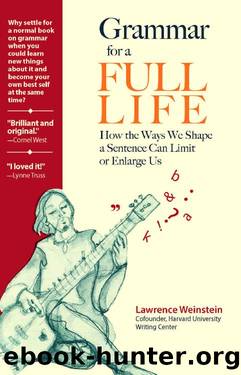Grammar for a Full Life: How the Ways We Shape a Sentence Can Limit or Enlarge Us by Lawrence Weinstein

Author:Lawrence Weinstein
Language: eng
Format: mobi, epub
Tags: Grammar, English language, Expression (Philosophy), Language Arts, Psychological Aspects, Writing, Memoir
ISBN: 9781734692723
Publisher: Lexigraphic Publishing
Published: 2020-11-15T20:00:00+00:00
Man Being Strangled by a Giant Paragraph,
by George Grosz (courtesy, the Estate of George Grosz)
Distinguishing How
Youâre Perceived from
Who You Are
Modeling the I-Statement
Decades ago, psychologists who led therapy groups introduced what still seems to me a powerful linguistic means to keep people from confusing their reactions to each other with the truth about one another. That means was I-statements. Rather than letting one group participant say to a second one, âYouâre a threatening woman,â they required all participants to refrain from definitional character assassination and to confine themselves, instead, to reports of their own feelings. âYouâre threateningâ became âI feel threatened by you.â
Generally speaking, we donât know enough about each other to sum each other up. In general, we do better saying how the other person affects us. With I-statements,
You like putting people down, Bob.
gives way to
In that meeting we just had, I felt belittled by you, Bob.
and the you-statement
Sandra, you are one obsessive micromanager.
is supplanted by
Sandra, I feel I need more discretion in this project than youâve given me so far.
Books on raising children, such as Thomas Gordonâs P.E.T. [Parent Effectiveness Training] in Action, contain many good examples. There, in the mouth of a man whose four-year-old daughter doesnât understand how their play together has exhausted him, the exasperated you-line (slightly tweaked by me)
You stop being a pest now, Iris.
becomes the infinitely kinder I-line
Hey, kid, Iâm just too wiped out to play more with you now, okay?
I can tell you this much: Whenever I have found myself on the receiving end of a reductive you-statement, itâs triggered my defenses and transformed me into someone quite unpleasant, concealing the authentic, more complex me for a while. To that extent at least, my self-appointed critic succeeds in making me and his portrayal of me into one and the same thingâwhich, of course, rankles.
Unfortunately, though, we canât simply dictate what types of expression get addressed to us. The undemeaning I-statements that, ideally, would come our way are not ours to make.
What we can do is:
model the alternative ourselves
diminish (if not ever quite eliminate) the ill effects of others pigeonholing us by noticing what they are doing
every now and then, take opportunities to call our accusersâ attention to their definitional habits of speech, and let them know we donât believe they do us justice.
Download
Grammar for a Full Life: How the Ways We Shape a Sentence Can Limit or Enlarge Us by Lawrence Weinstein.epub
This site does not store any files on its server. We only index and link to content provided by other sites. Please contact the content providers to delete copyright contents if any and email us, we'll remove relevant links or contents immediately.
Cecilia; Or, Memoirs of an Heiress — Volume 1 by Fanny Burney(32549)
Cecilia; Or, Memoirs of an Heiress — Volume 2 by Fanny Burney(31948)
Cecilia; Or, Memoirs of an Heiress — Volume 3 by Fanny Burney(31932)
The Lost Art of Listening by Michael P. Nichols(7494)
Asking the Right Questions: A Guide to Critical Thinking by M. Neil Browne & Stuart M. Keeley(5762)
We Need to Talk by Celeste Headlee(5608)
On Writing A Memoir of the Craft by Stephen King(4936)
Dialogue by Robert McKee(4389)
Pre-Suasion: A Revolutionary Way to Influence and Persuade by Robert Cialdini(4224)
I Have Something to Say: Mastering the Art of Public Speaking in an Age of Disconnection by John Bowe(3880)
Elements of Style 2017 by Richard De A'Morelli(3343)
The Book of Human Emotions by Tiffany Watt Smith(3304)
Fluent Forever: How to Learn Any Language Fast and Never Forget It by Gabriel Wyner(3079)
Name Book, The: Over 10,000 Names--Their Meanings, Origins, and Spiritual Significance by Astoria Dorothy(2982)
Good Humor, Bad Taste: A Sociology of the Joke by Kuipers Giselinde(2945)
Why I Write by George Orwell(2945)
The Art Of Deception by Kevin Mitnick(2797)
The Grammaring Guide to English Grammar with Exercises by Péter Simon(2740)
Ancient Worlds by Michael Scott(2682)
